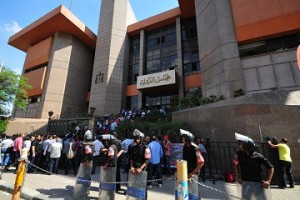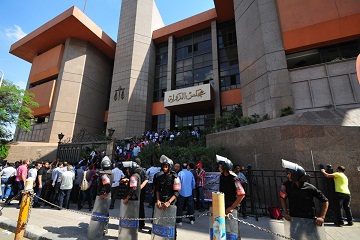
The suspension of several Egyptian courts goes on despite the decision of a number of judicial bodies to supervise the referendum on the constitution, due to be held on 15 December.
The Judges’ Club announced the suspension in its general assembly, which is due in two weeks’ time, as a response to the constitutional declaration released by President Mohamed Morsy on 21 November. The declaration was seen by the Judges’ Club as a transgression against the judiciary. The club also threatened any judges who do not abide by its decision with suspension.
The Judges’ Club confirmed that a new general assembly is needed in order to revoke the suspension decision. The Judges’ Club is scheduled to hold a press conference Tuesday announcing whether or not it will supervise the referendum.
Deputy Minister of Justice, Zaghloul Al-Belshy, called on all judges to lift their strike and return to courts, reported state-owned news agency MENA. Al-Belshy, in a statement released Monday, also called on judges to “answer the nation’s call” by supervising the referendum.
“When the 21 November constitutional declaration was issued, all of us, angered, took a stand in support of the judiciary’s independence,” Al-Belshy said, “your stand has been fruitful and the declaration has been revoked. There is, therefore, no justification for the continuation of suspending courts.”
Al-Belshy also stated that any stance towards the draft constitution is a political matter that doesn’t concern the judges. He added that it is prohibited for judges to state an opinion regarding the draft constitution, according to article 73 of law 46 for the Judiciary.
Judicial bodies have gone strike to an unprecedented level during the past two weeks. The Cassation Court, the Appeals Court and most primary courts in Cairo are still suspending work. The Cassation Court, which sits atop of the judicial hierarchy, held a general assembly meeting late November and voted 270 to 19 to suspend work until Morsy rescinds his declaration.
The 21 November declaration allowed Morsy to dismiss former Prosecutor General Abdel Meguid Mahmoud and replace him with Tala’at Abdallah, who Morsy chose unilaterally. Judges saw the decree as an attack on the independence of the judiciary but the president insisted it was necessary in order to protect the revolution from corrupt individuals.
Though the declaration has been revoked, all actions taken based on it remain valid, including the appointment of Abdallah.
Additional reporting by Ahmed Aboul Enein


